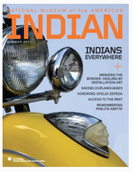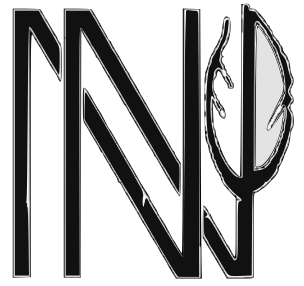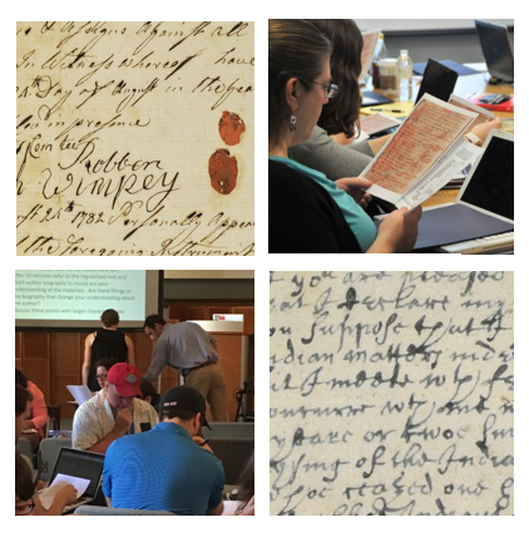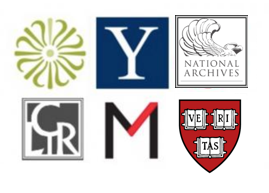Who We AreThe Native Northeast Research Collaborative (formerly The Yale Indian Papers Project) is an inclusive digital humanities endeavor that engages tribes, scholars, educators, students, and the general public in the study of the Native presence in the Atlantic Northeast.
The Collaborative accomplishes its mission through a number of "common ground" programs and initiatives that seek an understanding of the history of a shared place. With tribal partnerships extending throughout New England, New York, and the Mid-West, the Collaborative represents an innovate model of intercultural cooperation that brings research on Northeastern Indians into the 21st Century. |
|
Our Mission
|
To recover and provide greater access to the history of the Indigenous people(s) of the Atlantic Northeast for the purposes of research, teaching, scholarly analysis, storytelling, and community-based projects
|
Our Methods |
We have developed a number of Common Ground programs and initiatives that promote the Collaborative's mission.
The Native Northeast Portal Primary source materials by, on, or about Northeast Indians from repositories around the world are digitized, transcribed, annotated, and brought together with scholarly and tribal commentary into one edited digital collection. The freely-available Portal currently contains thousands of primary resource records associated with dozens of Native communities. Educational Outreach Initiatives The Collaborative promotes its mission through classroom presentations, teacher workshops, and consultations, inspiring a new generation of scholars to pursue careers in the Humanities or be enlightened by the Native world around them. Tribal Engagement Initiatives Historical documents and the stories they tell are repurposed for tribal community needs. The Portal's resources have been applied to reservation archaeological investigations, cultural programs, repatriation efforts, and museum exhibits. Native American Internship Program Designed to engage individuals in the processes of a digital humanities project, the Native American Internship Program offers community scholars the opportunity to recover the Indigenous historical record in various ways: transcribing, annotating, managing databases, and creating community-based stories. |
|
Our Impact
|
The Collaborative's ongoing Common Ground Programs and Initiatives
|
Our Story |
The Collaborative (formerly the Yale Indian papers Project) began more than 20 years ago as a response to pressing needs of the New England tribes, academics, and scholarly researchers who were working on various efforts -- academic scholarship, cultural revitalization, archaeological investigations, museum development, federal recognition research, or land management.
The discussions revealed, as a common and urgent concern, a need for access to reliable primary source material on the area’s Native peoples. With the documentary record being highly fragmented and widely dispersed around the world, attempts to view the documents were prohibitively time-consuming and costly. With advice from these stakeholder communities, Project organizers committed to deliver reliable access to primary sources of American Indians in the Northeast with the prospect of providing new Atlantic World perspectives on the Native presence in the region. In 2002, the project found a home at Yale University, where it established itself as one of the country's leading Native digital humanities efforts, recognized as a national model for innovative intercultural cooperation. Generous grants from the National Endowment for the Humanities, the National Historical Publications and Records Commission, and the Andrew W. Mellon Foundation/The Council on Library and Information Resources allowed for the publication of three centuries of political, religious, economic, and military materials regarding Native communities in Connecticut and Massachusetts. Researchers can now readily access primary sources about land loss, slavery, missionary efforts, African American presence, colonial, imperial, and state intervention, westward migration, and Indigenous leaders' efforts to express their sovereignty to an increasingly indifferent world. These themes have proved to be particularly useful for scholarly publications, student research, and tribal communities' needs. More recently, the Collaborative has adopted the cultural protocol-based Mukurtu CMS as its publishing platform and is developing pathways for more meaningful collaboration with the appropriate contemporary descendant communities. |
Recent Publications

Paul Grant-Costa and Tobias Glaza, "Access to the Past: A New Tribal-Friendly Approach Explains Old Archives," American Indian, Summer 2017, Volume 18, No. 2



